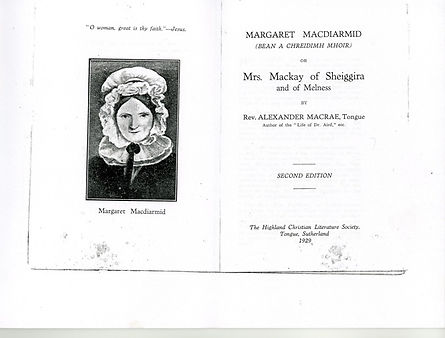The History of the Church in Mackay Country
By Reverend John Mann
Secession
This measure had overwhelming support in the Lowlands, but in the Highlands, there was considerable unease, and the following year, two ministers and a number of people left the Free Church to form the Free Presbyterian Church. In Mackay Country, Free Presbyterian congregations were established at Scourie (Eddrachillis), Kinlochbervie, and Strathy.
More division was to come. In 1900, the Free Church joined with another body, called the United Presbyterian Church to form the United Free Church. For many of those who had been unhappy with the Declaratory Act, this was the last straw, and they refused to go into the United Free Church. While most of the Free Church people in the Mackay Country entered the union, in Strathy, Farr, Tongue, and Eddrachillis, Free Church congregations continued to exist beside the United Free Church congregations.
Subsequent divisions have occurred. In 1988, there was a division in the Free Presbyterian Church about church discipline which led to some Free Presbyterians leaving to form Associated Presbyterian Churches. This happened in Scourie, Kinlochbervie, and Strathy. In the year 2000, a split in the Free Church led to some people leaving to form the Free Church (Continuing). This affected the Eddrachillis congregation. However, it wasn’t all division. In 1929, the United Free Church joined with the Church of Scotland.
Trends in 20th Century Church Life
There have been four other discernible trends over the course of the 20th century in church life. One is the gradual disappearance of Gaelic from the life of the church. The Second Statistical Account for Durness (written 1834) states “With the exception of eight families from the south of Scotland, all the natives speak Gaelic. Though a considerable proportion of the young can speak English, yet very few are able to follow out or understand an English sermon. Indeed, even those who speak and understand the English well, always prefer the Gaelic services.”
English services were held regularly in the Mackay Country, even in the 18th century. For example a recommendation was made that one discourse at least should be in English each Sabbath at Durness. In Tongue, it was the practice to have a short English service in the middle of the longer and more popular Gaelic service. Over the course of the years, English came to take an equal place with Gaelic.
During the 20th century, Gaelic services slowly disappeared. In Kinlochbervie, there was a weekly Gaelic as well as English service each Sunday in the Church of Scotland until the 1950s. By the early 1970’s, Gaelic services had disappeared, except for occasional special services.
A second, and closely related trend, is the change in traditional patterns of church service, particularly with regard to church music. In 1900, the use of organs or other musical instruments would have been considered to be improper in churches in the Mackay Country. Over the years, however, most United Free and Church of Scotland congregations obtained organs. In places like Kinlochbervie, singing continued to be unaccompanied, even in the Church of Scotland, until the 1960s. Free Church and Free Presbyterian congregations, however, still maintain the old pattern of unaccompanied singing and the use of psalms only.
A third trend is growth of other religious groups. Increasing social mobility means that people come to settle in the Mackay Country from all parts of the country - and beyond. No longer could any parish minister say that there were “no Dissenters, Seceders, Episcopalians or Roman Catholics in the parish.” And this has resulted in occasional services by non-Presbyterian groups (particularly the Episcopalians) taking place in the Mackay Country.
And finally, there is the decline of the church attendance. This is partly due to shrinking populations - but more due to the decline in commitment to organised religion. And, it must be said, “Scarce could one be found to repeat the Shorter Catechism.” The situation in the whole of the Mackay country at the beginning of the 21st century is remarkably like that which William Mackenzie found in 1769 in Tongue. One wonders what this century will bring.




Around 1980 - Fraser Tallach, minister of the Free Presbyterian Church
Kindly donated by: Edward Morrison ED35A90
Front cover of the Rev Fraser Tallach's book 'The Open Door'. The book is an outline of the Rev Tallach's controversies with the church, mostly over the word 'Protest'.
Kindly donated by: Nancy Gunn ED34A24